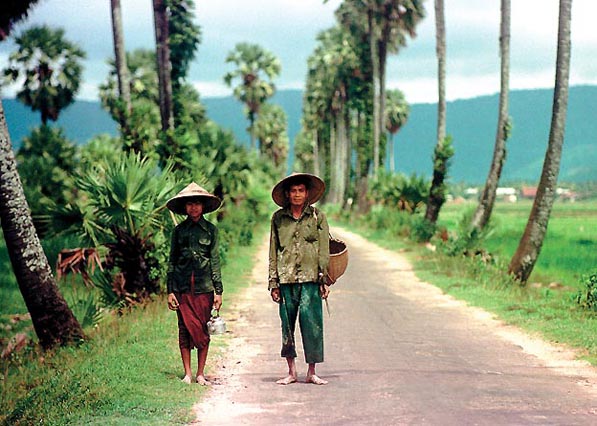Port Project Raises Concerns about Rights, Environment

A new deep-sea port and special economic zone in Tavoy, southern Burma, will bring much-needed infrastructure to the military-ruled country and be a boon to regional trade, but will also present serious risks to the local population and environment, according to experts.
The multi-billion dollar project, which will be financed by the Bangkok-based Italian-Thai Development Public Company, will cover an area of about 260 square kilometers (100 square miles) and affect more than 30,000 people from 19 villages in Yephyu and Longlon townships, near Tavoy, the capital of Tenasserim Division.
Local sources say that even though preparatory work on some parts of the project has already begun, residents of the area still haven't been told how the plan to build what is expected to become Southeast Asia's biggest special economic zone will affect them.
Villagers in the area say they are worried about where they will be relocated to and how they will be compensated for the loss of their land, but don't expect to have any choice in the matter. “If they order us to move, we can't resist,” a villager from Nabule, in the project area, told The Irrawaddy.
Italian-Thai will reportedly spend US $8.6 billion on the new mega-project, which will combine a deep-sea port, industrial estate and trans-border route with sea, road and rail links with Thailand.
The proposed industrial estate will contain a power plant, a steel mill, an oil refinery, a petrochemical complex, a fertilizer plant, a shipbuilding and maintenance yard and a variety of light- and medium-industry factories, as well as a pipeline linking Tavoy to Pu Nam Ron in Thailand’s Kanchanaburi Province.
There will also be residential and commercial developments, including a tourist resort and a recreation complex, according to a PowerPoint presentation prepared by Italian-Thai that is widely circulating on the Internet.
The 10-year project was signed in Naypyidaw on Nov. 2 of last year, five days before Burma held its first election in 20 years. Now groundwork for the first phase of construction—the road to Thailand, a water reservoir, a water and waste-water treatment plant and the 4000 MW coal-fired power plant—have been initiated and are due to be completed within five years.
The idea to create this massive new economic zone first started to gain traction in 2008, when the foreign ministers of Thailand and Burma signed a memorandum of understanding (MOU) on the sidelines of a meeting of Association of Southeast Asian Nations (Asean) foreign ministers in Singapore. It received a further boost late last year during a visit to Naypyidaw by Thai Prime Minister Abhisit Vejjajiva, who signed an agreement on the project with his Burmese counterpart Thein Sein on Oct. 11.
However, there are still hurdles facing the project, largely due to the involvement of Burma's Western-sanctioned military regime. The Asia Development Bank (ADB) has declined to support the project, despite the fact that it will connect with the three economic corridors of the ADB's Greater Mekong Sub-Region development plan, which aims to create links between the economies of mainland Southeast Asia and China. Thailand's Kasikorn Bank has also rejected Italian-Thai's bid for financing, and the support of major shipping companies and manufacturers is also doubtful. However, according to a report by the International Herald Tribune, Italian-Thai has received backing for the project from a private bank that it would not name.
Meanwhile, Thailand's Minister of Industry, Chaiwut Bannawat, will lead a delegation of Thai business representatives on a fact-finding mission to Burma from Jan. 18-22 to seek information on the Burmese regime's investment policy and its framework for development of the Tavoy project, according to reports by The Nation, a Bangkok-based English-language daily.
While the Thai investors seem confident of the project's eventual success, other observers are less sure about its prospects, at least in terms of bringing any real benefit to the local economy.
Sean Turnell, an expert on the Burmese economy at Macquarie University in Sydney, Australia, said he was cautiously optimistic about the project. “Longer term, and come a reasonable government in Burma that was genuinely concerned with economic development, Tavoy could become the sort of infrastructure the country needs. But even such longer-term benefits presuppose such a government will emerge,” he said.
In a properly governed economy, the increased efficiencies from such a facility would pay dividends that would accrue to the country hosting it, the Australian economist also noted.
1 | 2 | 3 next page »
|
||
|
||
|
||
|
||
- 'My Wife Died From Police Abuse,' Says Husband
- US Says Observer Conditions Don't Meet Int'l Standards
- 159 Observers to Monitor Burma Election
- Govt to Address Breaches of SSA-South Ceasefire: Aung Min
- Burma Investors Pin Hopes on Seminal Sunday
- Malaysia PM Leads 50-Strong Delegation to Burma
- US Congress to Assess Burma's Political Prisoner Issue
- Rangoon Woman in Police Station Death Plunge
- Burmese Legal System Remains Tool of Govt: AHRC
- Burmese Army Chief Defends Political Role
